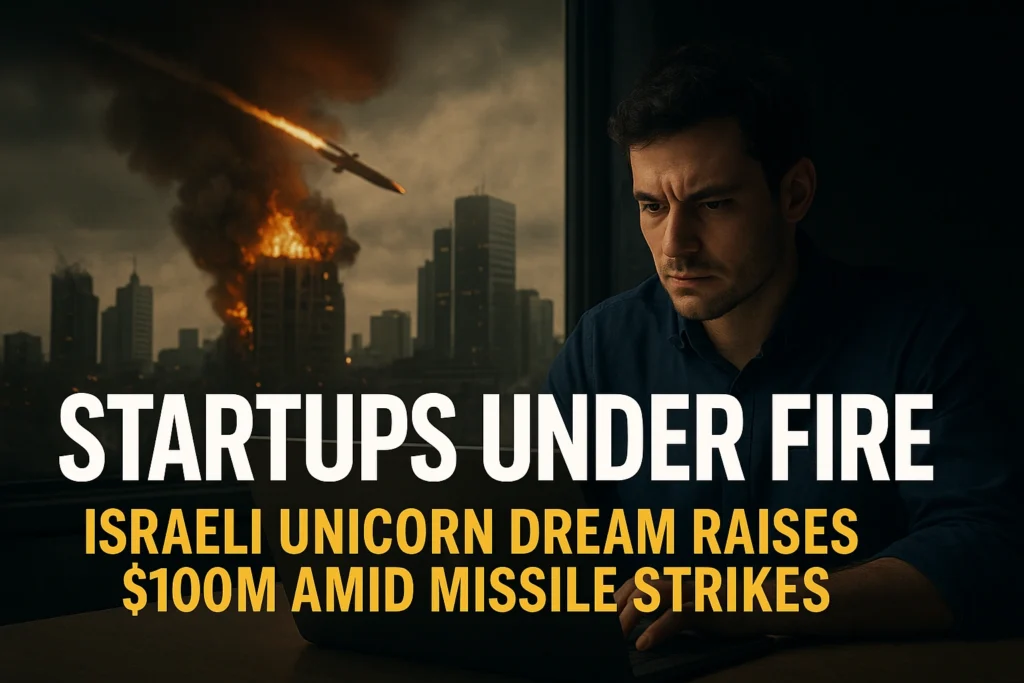While air raid sirens echoed across Tel Aviv, and missiles struck near startup offices, something unexpected was happening — Israeli founders weren’t fleeing. They were fundraising. Coding. Pitching. Delivering. One of them even raised $100 million from a bomb shelter.
In early June 2025, with tensions peaking in the Middle East and rockets falling within meters of key tech zones, most countries would expect business to halt. But not in Israel.
Instead, something remarkable unfolded.
Tel Aviv-based cybersecurity-AI startup Dream closed a $100 million Series B round — right in the middle of a missile strike. With 30 of its 220 employees called to military reserve duty, and explosions just outside its office, Dream not only survived — it became Israel’s first cyber unicorn of the year, valued at $1.1 billion.
A Warzone Isn’t Usually Where Unicorns Are Born — But This Is Israel
Dream’s CEO, Shalev Hulio, isn’t a stranger to crisis. The co-founder of NSO Group, Hulio built Dream alongside high-profile figures like former Austrian chancellor Sebastian Kurz and cybersecurity expert Gil Dolev. But even by Israeli standards, this fundraising round was extraordinary.
Just days before the announcement, a rocket exploded less than 50 meters from Dream’s headquarters. Hulio, who was simultaneously serving in an IDF search-and-rescue unit, managed his dual roles — saving lives by day, updating investors by night.
“You wake up, check for team safety, lead your military unit, and then close a $100 million round,” a Dream staffer joked. But behind the humor is grit. Dream’s employees pivoted to remote setups, activated satellite offices in Vienna and Abu Dhabi, and kept the company’s heartbeat strong.
The Office Went Dark. Zoom Stayed On.
Across Israel, many startups found themselves in a similar situation. Rockets falling. Team members called to duty. Buildings damaged. But there was no downtime. Instead of boardrooms, there were bunkers. Instead of silence, Slack channels buzzed louder than ever.
For Dream, the answer was flexibility and global reach. As the war intensified, they shifted operations to overseas teams and maintained development cycles from safe zones. The company’s flagship product — a “Cyber Language Model” (CLM) that predicts and prevents digital threats — continued development on schedule.
It wasn’t just about business. It was about sending a message: You can’t bomb innovation into silence.
Global Investors Didn’t Blink — They Wired Money
Investors around the world took notice. Rather than pausing deals, they pushed them forward.
Dream’s latest round drew heavyweight backing from Bain Capital, Group 11, Aleph, and Tau Capital. These funds didn’t just invest in a product — they backed a mindset.
“Even under rocket fire, they executed with precision. That’s a team you want to invest in,” one investor reportedly said.
This wasn’t an isolated case. Across the Israeli startup ecosystem, venture capital continued to flow. Despite the war, $4 billion in cybersecurity funding was recorded in 2024 — double the year before. Growth-stage companies saw nearly $3 billion of that, proving that confidence in Israeli innovation remains unshaken.
Xtend, Reco, and the Bigger Wave of Resilience
Dream isn’t alone. Several other startups rose during the chaos.
- Xtend, a company making AI-driven drones for tactical missions, saw accelerated adoption and funding — even demonstrating its tech on the battlefield.
- Reco, a security collaboration startup, raised $25 million from Insight Partners, despite disruptions across the team.
Each story followed the same pattern: crisis hits, founders pivot, startups rise.
What’s Driving This Grit?
There’s no single answer — but Israel’s ecosystem has always been different.
- Military-trained founders: Most startup leaders are former soldiers or cyber unit veterans. They’re used to high-pressure scenarios.
- Remote-native culture: Teams are built to function across time zones, with distributed operations already in place.
- Resilient investors: Global VCs betting on Israel understand that war may disrupt — but rarely derails.
According to Adi Levanon, managing partner at Selah Ventures, “We closed deals while literally texting from shelters. That’s what it means to build in Israel.”
Jon Medved, CEO of OurCrowd, went further: “We didn’t slow down. If anything, we doubled down.”
Dream’s Future: Scaling With Purpose
Fresh off its funding, Dream is already scaling up globally. The company plans to expand its AI capabilities and double its international headcount — all while keeping its Israeli heart beating strong.
Its Cyber Language Model, which mimics how hackers and defenders think, is designed to protect sensitive infrastructure — hospitals, water plants, and national grids. It’s a product born from conflict, built to defend against digital wars that mirror physical ones.
Final Word: Israel’s Startups Just Rewrote the Rulebook on Resilience
What we’re seeing in Israel isn’t just determination — it’s operational excellence under fire. These aren’t feel-good stories. These are proof points: that a startup can be bombed one day and funded the next.
And if there’s a lesson for the world, it’s this:
Innovation doesn’t stop for sirens. It finds a new way to move forward.
